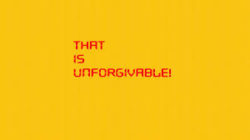The text is below the video…
“That’s Unforgiveable!?” Tuesday Meditation. 05-12-20. Alan Neale. Trinity Church, Newport RI.
28 Truly I tell you, people can be forgiven all their sins and every slander they utter, 29 but whoever blasphemes against the Holy Spirit will never be forgiven; they are guilty of an eternal sin.” 30 He said this because they were saying, “He has an impure spirit.”
Throughout the four Gospels there is a collection of Jesus words that are named as “The Hard Sayings of Jesus”. Such as these are called “hard” partly because they are hard to understand and also because they seem hard/harsh coming from the lips of a gentle Shepherd.
The reference to the “unforgiveable sin” definitely merits a place in this catalogue of “hard sayings.
As with any challenging text (and to prevent agenda-driven eisgesis) it’s always good to follow Luther’s guidance an interpret “a scripture” in the light of “the [whole] scripture”. The context always is of strong, powerful, transforming divine love.
It’s good to note also that this hard saying is the context of yet more theological nit-picking and irrational controversy animated by the animus of the religious leaders towards Jesus.
And to note that elsewhere in the Gospels Jesus sometimes uses sharp, attention-getting irony to make a point… even the most literalist of Bible readers seem to eyes and limbs despite Jesus suggesting that these should be cut out/cut off if they cause sin!
The Greek word for “blaspheme” suggests a stout refusal to acknowledge good, an obstinate resistance to see anything as worthy of respect and veneration; a shaking fist in the air declaring defiance to God and uttering “I will not be saved”. To “blaspheme against the Holy Spirit” is to deny the possibility of personal transformation from evil to good, from petty to inclusive, from meanness to generosity – it denies the invitation to move from the heaviness of guilt to the expansiveness of being forgiven. Note, the blasphemer cannot alter one whit the operation of the Holy Spirit but, it seems, she/he can refuse “for this age” the psychic delights of being forgiven, accepted and transformed.
I have met many who seem unable to grasp the concept of being forgiven; it seems that such poor, wretched souls are wary of becoming vulnerable and discovering that it this economy of forgiveness is a hoax. Generally this attitude is not adopted willingly but has made its mark over years of mistreatment, abuse and disillusionment. At times such a person seems lost… but our Good Shepherd is here to seek and to save “the lost”.
To forgive means to send something away, to remit a debt, to release someone from an obligation. But these psychic delights must be appropriated otherwise they are left without appropriation; and one of the tasks of spiritual direction and counselling is to enable those with guilt and shame to reach out and appropriate the generous gift of God.
And note well, the one sin that cannot be forgiven is not sexual; it’s not spontaneous, uncontrolled thoughts; it’s not struggling with addiction; it’s not even murder. And even that one sin can be left in the hands and heart of the Judge of all the earth who must do right and be true to His character.
I finish with two rather long quotations (both somewhat dated in style but helpful in content).
The first is written in a sermon by Dr. Samuel Cox (towards the end of the 19th century):
I shall never forget, says Dr. Samuel Cox,1 [Note: Expositor, 2nd Ser., iii. 321.] the chill that struck into my childish heart so often as I heard of this mysterious sin which carried men, and for ought I knew might have carried even me, beyond all reach of pardon; or the wonder and perplexity with which I used to ask myself why, if this sin was possible,—if, as the words of our Lord seem to imply, it was probable even and by no means infrequent,—it was not clearly defined, so that we might at least know, and know beyond all doubt, whether it had been committed or had not. Since then, I have again and again met with men and women of tender conscience and devout spirit who, by long brooding over these terrible words, had convinced themselves that they had fallen, inadvertently for the most part, into this fatal sin, and whose reason had been disbalanced and unhinged by a fearful anticipation of the doom they held themselves to have provoked. The religious monomaniac is to be found in well-nigh every madhouse in the kingdom; and in the large majority of cases, as there is only too much ground to believe, he has been driven mad by the fear that he has committed the unpardonable sin: although the man who honestly fears that he has committed this sin is just the one man who has the witness in himself that he cannot possibly have committed it.
The second quotation from Anthony Trollope’s Barchester Towers
“For days to come (Mr. Obadiah Slope) positively felt the sting upon his cheek, whenever he thought of what had been done to him. He could not refrain from calling her by harsh names, speaking to himself as he walked through the streets of Barchester. When he said his prayers, he could not bring himself to forgive her. When he strove to do so, his mind recoiled from the attempt, and in lieu of forgiving ran off in a double spirit of vindictiveness, dwelling on the extent of the injury he had received. And so his prayers dropped senseless from his lips” – Barchester Towers 1857, 2nd in series Barchester Chronicles.
Lord save us ever from experiencing prayers dropping senseless from our lips. Amen

